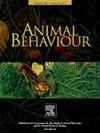Parental predator exposure affects offspring boldness and laterality in the stickleback
IF 2.3
2区 生物学
Q2 BEHAVIORAL SCIENCES
引用次数: 0
Abstract
Parental influences on offspring phenotype occurring through pathways other than via inherited DNA sequences are known as parental effects. Parental effects profoundly influence offspring behaviour, including behaviour laterality and personality, two traits that are widespread and of fundamental importance in the animal kingdom with clear fitness consequences. However, the impact of parental effects on the interaction between behavioural laterality and personality within the same species has not been previously explored. If such a link exists, it would deepen our understanding of personality traits, extending them to brain laterality and its underlying neurobiology. In addition, if both traits are causally linked, it may constrain evolution as changing one of these traits would affect the other. The aim of this study was to examine whether offspring personality traits and behavioural laterality are related and can simultaneously be influenced by parental effects, suggesting a common underlying mechanism. Here we exposed parents of an egg-laying species, the stickleback Gasterosteus aculeatus, to a predator cue or not and examined the impact of this exposure on two behavioural traits of their offspring. Shortly after laying, clutches were split: half were reared without predator cues for 12 weeks before behavioural testing, and the other half were used for cortisol analysis. We found that both parents and offspring from predator-exposed parents were bolder, with the offspring more likely to show lateralized behaviour, and were smaller than offspring from parents that were not exposed to predation. The egg cortisol levels were too low to be detected by LC-MS/MS. To our knowledge, these results are the first to indicate that parental effects under varying predation conditions can influence laterality, personality and growth of offspring within the same individuals, although further evaluation and experiments are needed to determine the role of maternal cortisol.
求助全文
约1分钟内获得全文
求助全文
来源期刊

Animal Behaviour
生物-动物学
CiteScore
4.60
自引率
8.00%
发文量
236
审稿时长
10.2 weeks
期刊介绍:
Growing interest in behavioural biology and the international reputation of Animal Behaviour prompted an expansion to monthly publication in 1989. Animal Behaviour continues to be the journal of choice for biologists, ethologists, psychologists, physiologists, and veterinarians with an interest in the subject.
 求助内容:
求助内容: 应助结果提醒方式:
应助结果提醒方式:


